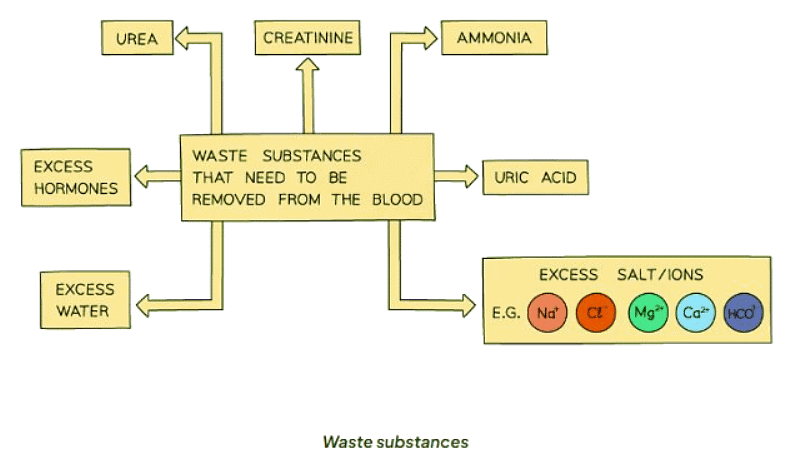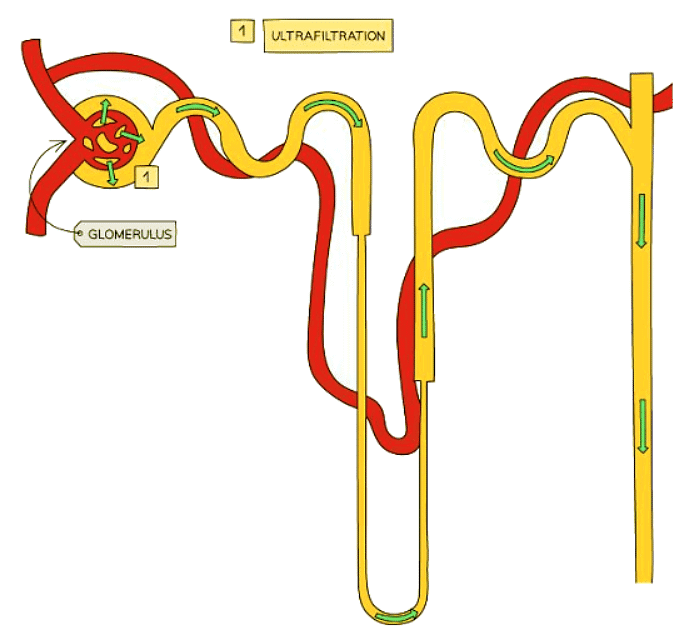Year 11 Exam > Year 11 Notes > Biology for GCSE/IGCSE > The Kidney
The Kidney | Biology for GCSE/IGCSE - Year 11 PDF Download
The Kidney & the Nephron
The kidneys
The kidneys, situated in the posterior abdomen, perform two crucial roles within the body:
- They control the water levels in the blood, a vital function for sustaining blood pressure.
- They eliminate harmful metabolic waste products, like urea, as well as excess substances, such as salts, from the body.


The Nephron
- Each human kidney comprises about a million tiny structures known as nephrons, also referred to as kidney tubules or renal tubules.
- Nephrons originate in the cortex of the kidney, extend into the medulla, and then return to the cortex, facilitating the filtration process.
- After processing, the contents of the nephrons move to the innermost part of the kidney where urine accumulates before being directed to the bladder through the ureter for storage.

1. Ultrafiltration


Process of Ultrafiltration:
- Arterioles branch off the renal artery and lead to each nephron, where they form a knot of capillaries (the glomerulus) inside the cup-shaped Bowman's capsule.
- The capillaries narrow further into the glomerulus, increasing pressure on the blood, leading to ultrafiltration.
- This pressure causes small molecules in the blood to move into the Bowman's capsule, forming the filtrate.
- Substances like glucose, water, urea, and salts are forced out of the capillaries.
- Some of these substances are reabsorbed back into the blood later in the nephron.
Components of Filtrate:

2. Selective Reabsorption
Reabsorption of Glucose Diagram showing the reabsorption of glucose
Diagram showing the reabsorption of glucose
- Glucose is the initial substance to undergo reabsorption upon entering the Bowman’s Capsule, specifically at the proximal (first) convoluted tubule.
- This process is facilitated by active transport mechanisms.
- The nephron is structured to support this activity by harboring numerous mitochondria, which furnish energy for the active transport of glucose molecules.
- Reabsorption of glucose is exclusive to the proximal convoluted tubule, as the requisite transporters are solely present in this segment.
- Under normal blood glucose levels, a sufficient number of transporters are available to reclaim all glucose from the filtrate into the bloodstream.
- However, individuals with diabetes struggle to regulate their blood glucose levels, often experiencing elevated levels, resulting in incomplete reabsorption of filtered glucose at the proximal convoluted tubule.
- With no alternative site for reabsorption, the surplus glucose persists in the filtrate and ultimately appears in the urine.
- Consequently, urine testing for glucose presence is commonly employed as an initial diagnostic measure for diabetes.
Reabsorption of Water & Salts
- During the journey of the filtrate through the Loop of Henle, essential salts undergo reabsorption into the bloodstream through processes like diffusion and active transport.
- The reabsorption of salts triggers the movement of water by osmosis, where water molecules follow the salts back into the blood.
- Additionally, from the collecting duct, water is reabsorbed in varying quantities based on the body's current hydration needs.
Question for The KidneyTry yourself: What is the main function of the kidneys?View Solution
The document The Kidney | Biology for GCSE/IGCSE - Year 11 is a part of the Year 11 Course Biology for GCSE/IGCSE.
All you need of Year 11 at this link: Year 11
|
110 videos|158 docs|34 tests
|
FAQs on The Kidney - Biology for GCSE/IGCSE - Year 11
| 1. What is the main function of the kidney? |  |
Ans. The main function of the kidney is to filter waste products and excess substances from the blood to form urine.
| 2. How many nephrons are there in each kidney? |  |
Ans. Each kidney contains approximately 1 million nephrons, which are the basic functional units responsible for filtering the blood.
| 3. What is the role of the nephron in kidney function? |  |
Ans. The nephron plays a crucial role in kidney function by filtering the blood, reabsorbing essential substances, and regulating the balance of electrolytes and fluids in the body.
| 4. How does the nephron help in maintaining the body's acid-base balance? |  |
Ans. The nephron helps in maintaining the body's acid-base balance by regulating the excretion of hydrogen ions and reabsorption of bicarbonate ions.
| 5. What are some common kidney disorders that can affect the nephron's function? |  |
Ans. Some common kidney disorders that can affect the nephron's function include chronic kidney disease, kidney stones, and glomerulonephritis.

|
Explore Courses for Year 11 exam
|

|
Signup for Free!
Signup to see your scores go up within 7 days! Learn & Practice with 1000+ FREE Notes, Videos & Tests.
Related Searches
















